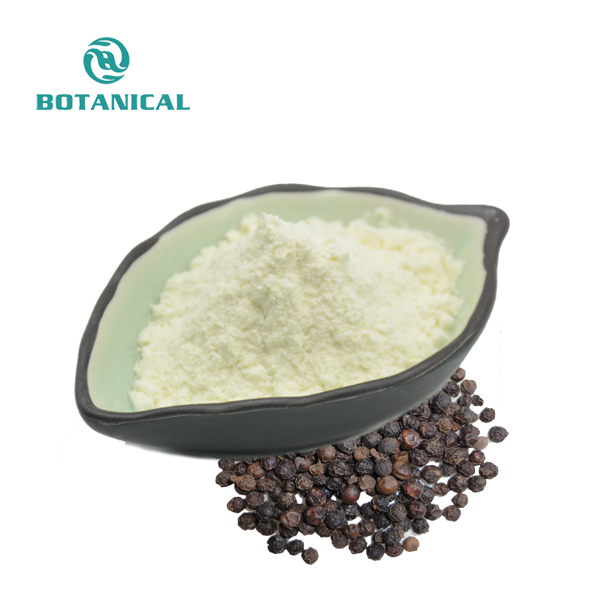One of the most widely used spices in the world is black pepper. Gotten from peppercorns from the Flute player nigrum plant, dark pepper has been valued for its impactful flavor profile and restorative properties for millennia. As a nutritional supplement that is touted to provide a variety of potential health benefits, black pepper extract is currently gaining popularity.
 Figure. Black pepper seed extract by Botanical Cube Inc.
Figure. Black pepper seed extract by Botanical Cube Inc.
Overview of Black Pepper Extract
Black pepper extract is a concentrated formulation derived from black peppercorns. Through an extraction process, key active compounds are isolated from the peppercorns, with the primary bioactive compound being piperine.
Black pepper’s distinct spicy and pungent flavor is due to piperine. It is a powerful alkaloid with anti-inflammatory and antioxidant properties. Notwithstanding piperine, dark pepper concentrate can contain natural oils like pinene, sabinene, limonene, caryophyllene, and linalool, all of which give smell and expected remedial advantages.
Black pepper’s use as a medicinal spice dates back more than 4,000 years to Indian Ayurvedic practices. Experts utilized peppercorns to treat gastrointestinal issues including runs, blockage, and swelling. Black pepper was also believed to stimulate digestion and enhance the bioavailability of other herbs and foods. Modern research has aimed to validate many of these traditional uses through scientific study.
Health Benefits of Black Pepper Extract
A number of potential health benefits have been associated with black pepper extract supplementation, particularly due to its active constituent piperine. Let’s explore some of the current research:
1 Digestive Health
Multiple studies have shown that black pepper extract can benefit digestion and may improve gut health. The powerful compound piperine has been shown to stimulate the taste receptors on the tongue, which triggers the pancreas to start secreting digestive enzymes[1]. This process kickstarts the digestive process even before foods reach the stomach.
In one study, rats fed black pepper showed enhanced activity of digestive enzymes like trypsin, chymotrypsin, and amylase[2]. The rats showed improved digestion and assimilation of nutrients. Piperine may also stimulate the secretion of hydrochloric acid in the stomach, which helps break down foods more efficiently[3].
By optimizing digestive secretions in the gut, water-soluble black pepper extract powder may improve digestion and nutrient absorption from foods. For those with gastrointestinal issues like indigestion, gas, and bloating, supplementing with black pepper extract may provide relief from symptoms.
2 Anti-Inflammatory Properties
The majority of modern diseases are caused by chronic inflammation. Due in large part to piperine, black pepper extract shows promise as a natural anti-inflammatory.
Piperine has been shown to have significant antioxidant activity and the ability to reduce the production of cytokines that are associated with inflammation[4]. By bringing down incendiary markers, dark pepper concentrate might give restorative impacts to fiery circumstances like joint pain, immune system illness, coronary illness, and metabolic disorder.
One animal study showed black pepper extract significantly reduced inflammation and joint swelling in rats with arthritis[5]. Another study found it decreased skin inflammation when applied topically[6]. More human research is still needed, but the early findings suggest potent anti-inflammatory activities.
3 Enhancing Nutrient Bioavailability
It has been demonstrated that black pepper extract, particularly when combined with piperine, increases the bioavailability and absorption of numerous nutrients.
One outstanding model is curcumin, the dynamic compound in turmeric. The body has a hard time absorbing and using curcumin effectively. Piperine, on the other hand, has been shown to increase bioavailability by 2000% in studies[7].
Black pepper extract may also aid in the absorption of other substances like CoQ10, selenium, beta-carotene, and various vitamins and minerals. Piperine is accepted to assist with forestalling the breakdown of supplements in the liver and stomach wall.
By improving the absorption of beneficial compounds, black pepper extract can help maximize the effects of supplements and a healthy diet.
Dosage and Considerations
When looking for a black pepper extract supplement, piperine content is key. Products will range from 5% up to 95% piperine. For health maintenance, 20-40mg of piperine divided into multiple daily doses is a commonly recommended dosage. For digestion issues, doses up to 100mg daily may be beneficial.
Black pepper extract is generally well tolerated, especially when taken with food. Minor side effects can include stomach upset, irritation, and nausea. It should be avoided by those with gallbladder or kidney disorders.
Due to its effects on increasing bioavailability, black pepper extract may impact the absorption of certain medications like blood thinners, antibiotics, and antidepressants, among others. It is best to consult your healthcare provider before starting any new supplements.
Culinary Uses and Availability
In addition to taking black pepper extract capsules or tablets, black pepper can provide benefits when used in foods. Its distinctive flavor and aroma come from piperine and essential oil compounds.
Black pepper extract is sometimes used as a food additive and preservative. It is commonly included in processed meats, snacks, gravies, sauces, and condiments. The extract ramps up flavor while also helping prevent spoilage.
Whole, cracked, and ground peppercorns are ubiquitous in savory cooking across the world. They pair especially well with eggs, vegetables, meats, fish, poultry, rice, and pasta dishes. A sprinkle of black pepper brings an aromatic spiciness to almost any meal.
Black pepper extract dietary supplements can be found in capsules, soft gel, or drop form online or at most health food stores.
Potential Disadvantages of Black Pepper Extract
While piperine black pepper extract appears to have many health benefits, there are a few potential side effects and disadvantages to consider:
– May cause stomach upset, diarrhea, or gastrointestinal discomfort when taken in large doses. Start with small doses.
– The strong flavor and aroma may be unpleasant for some. Capsule supplements avoid this issue.
– Can potentially interact with certain medications like blood thinners and antidepressants. Consult a doctor before use.
– Improperly processed pepper extracts may be contaminated with salmonella bacteria, a foodborne pathogen. Purchase reputable brands.
– Piperine may exacerbate symptoms for those with chronic kidney disease or gallbladder issues.
– Topical use may cause skin redness, flushing, and irritation in some individuals.
As with any supplement, it’s best to start with lower doses to assess tolerance. Speak with a healthcare provider if you have any specific medical conditions or take medications. While generally safe when used appropriately, large doses may cause unwanted side effects. Moderation is key.
Why Do Supplements Contain Black Pepper Extract?
There are a couple of reasons why many nutritional supplements include black pepper extract or piperine as an additive:
Bioavailability Enhancer – As discussed, one of the primary benefits of black pepper extract is its ability to increase the absorption and bioavailability of many compounds. Adding it to supplements helps maximize the delivery and efficacy.
Masking Strong Odors/Flavors – Some nutraceutical compounds, like curcumin, have bitter, unpleasant tastes. Black pepper extract helps provide a more appealing flavor profile.
Shelf Life – The anti-oxidant properties of black pepper extract can help slow oxidation and degradation of active supplement ingredients. This supports a longer shelf life.
Synergistic Effects – Black pepper extract may also have synergistic properties, meaning when combined with other compounds like turmeric or CoQ10, the effects are greater than the individual components.
Preservative – Through its antimicrobial properties, black pepper extract contributes to product preservation.
Next time you see black pepper listed in the “other ingredients” section of a supplement label, you’ll know why it’s there! It offers several advantages beyond a spicy flavor.
Is Black Pepper Extract Safe?
When used appropriately, black pepper extract is generally considered safe for most healthy adults. The possible side effects tend to be mild and often avoidable.
Several animal studies have indicated low toxicity of black pepper constituents at reasonable dosages[11]. Human data also shows minimal adverse reactions. A study giving participants up to 100mg of piperine daily found no serious side effects compared to placebo[12].
However, there are some precautions to keep in mind:
– Avoid taking high doses on an empty stomach, as this may cause gut discomfort. Take with meals.
– Those with gallbladder or kidney disorders should consult a doctor before using black pepper supplements.
– Discontinue use if any worrisome reactions occur, like stomach pain or diarrhea.
– Pregnant or breastfeeding women should exercise caution, as safety has not been established.
– May interact with certain medications, especially blood thinners and antidepressants. Speak with your physician.
– Choose properly processed, high-quality supplements to avoid potential contaminants.
Provided these precautions are heeded, black pepper extract remains one of the safer herbal supplements on the market with a long history of culinary use. As with any supplement, it’s wise to start slow and consult a healthcare provider if any concerns arise.
If you’re looking for a trusted China Black Pepper Extract supplier, Botanical Cube Inc. is a reputable choice. With our commitment to quality and customer satisfaction, we provide high-quality botanical extracts to meet your specific needs. Contact us at sales@botanicalcube.com or visit our website to learn more about our water-soluble black pepper extract and other botanical products. Start your journey towards natural migraine relief with Botanical Cube Inc.
References:
[1] Platel K, Srinivasan K. Digestive stimulant action of spices: A myth or reality? Indian J Med Res. 2004;119(5):167-179.
[2] Ahmed RS, Seth V, Pasha ST, Banerjee BD. Influence of dietary ginger (Zingiber officinales Rosc) on antioxidant defense system in rat: comparison with ascorbic acid. Indian J Exp Biol. 2000;38(6):604-606.
[3] Platel K, Srinivasan K. Studies on the Influence of Dietary Spices on Food Transit Time in Experimental Rats. Nutrition Research. 2001;21(9):1309-1314. doi:10.1016/s0271-5317(01)00349-6
[4] Bang JS, Oh DH, Choi HM, et al. Anti-inflammatory and antiarthritic effects of piperine in human interleukin 1β-stimulated fibroblast-like synoviocytes and in rat arthritis models. Arthritis Research & Therapy. 2009;11(2):R49. doi:10.1186/ar2662.
[5] Shreedhara CS, Vollala VR, Upadhya S. Enhanced retention of celecoxib-loaded mPEG-PCL micelles in synovial inflammation model. Eur J Pharm Sci. 2011;44(5):526-533. doi:10.1016/j.ejps.2011.10.024.
[6] Liju VB, Jeena K, Kuttan G. An evaluation of antioxidant, anti-inflammatory, and antinociceptive activities of essential oil from Curcuma longa. L. Indian J Pharmacol. 2011;43(5):526-531. doi:10.4103/0253-7613.85935
[7] Shoba G, Joy D, Joseph T, Majeed M, Rajendran R, Srinivas PS. Influence of Piperine on the Pharmacokinetics of Curcumin in Animals and Human Volunteers. Planta Medica. 1998;64(04):353-356. doi:10.1055/s-2006-957450.
[8] Sun Y, Lu N, Ling Y, et al. Piperine inhibits the proliferation and motility of human osteosarcoma cells by targeting mitochondrial respiration. Food & Function. 2019;10(1):340-348. doi:10.1039/c8fo02091e.
[9] Selvendiran K, Sakthisekaran D. Chemopreventive effect of piperine on modulating lipid peroxidation and membrane bound enzymes in benzo(a) pyrene-induced lung carcinogenesis. Biomedicine & Pharmacotherapy. 2004;58(4):264-267. doi:10.1016/j.biopha.2004.02.001.
[11] Daware MB, Mujumdar AM, Ghaskadbi S. Reproductive Toxicity of Piperine in Swiss Albino Mice. Planta Medica. 2000;66(03):231-236. doi:10.1055/s-2000-8533.
[12] Badmaev V, Majeed M, Norkus EP. Piperine, an Alkaloid Derived from Black Pepper Increases the Serum Response of Beta-Carotene During 14-days of Oral Beta-Carotene Supplementation. Nutrition Research. 1999;19(3):381-388. doi:10.1016/s0271-5317(99)00007-8.







